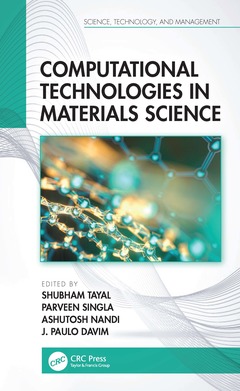Computational Technologies in Materials Science Science, Technology, and Management Series
Coordonnateurs : Tayal Shubham, Singla Parveen, Nandi Ashutosh, Davim J. Paulo

Advanced materials are essential for economic security and human well-being, with applications in industries aimed at addressing challenges in clean energy, national security, and human welfare. Yet, it can take years to move a material to the market after its initial discovery. Computational techniques have accelerated the exploration and development of materials, offering the chance to move new materials to the market quickly. Computational Technologies in Materials Science addresses topics related to AI, machine learning, deep learning, and cloud computing in materials science. It explores characterization and fabrication of materials, machine-learning-based models, and computational intelligence for the synthesis and identification of materials. This book
? Covers material testing and development using computational intelligence
? Highlights the technologies to integrate computational intelligence and materials science
? Details case studies and detailed applications
? Investigates challenges in developing and using computational intelligence in materials science
? Analyzes historic changes that are taking place in designing materials.
This book encourages material researchers and academics to develop novel theories and sustainable computational techniques and explores the potential for computational intelligence to replace traditional materials research.
Chapter 1 Fabrication and Characterization of Materials Chapter 2 Application to Advanced Materials Simulation Chapter 3 Molecular Dynamics Simulations for Structural Characterization and Property Prediction of Materials Chapter 4 Desirability Approach-Based Optimization of Process Parameters in Turning of Aluminum Matrix Composites Chapter 5 Spark Plasma-Induced Combustion Synthesis, Densification, and Characterization of Nanostructured Magnesium Silicide for Mid Temperature Energy Conversion Energy Harvesting Application Chapter 6 The Role of Computational Intelligence in Materials Science: An Overview Chapter 7 Characterization Techniques for Composites using AI and Machine Learning Techniques Chapter 8 Experimental Evaluation on Tribological Behavior of TiO2 Reinforced Polyamide Composites Validated by Taguchi and Machine Learning Methods Chapter 9 Prediction of Compressive Strength of SCC-Containing Metakaolin and Rice Husk Ash Using Machine Learning Algorithms Chapter 10 Predicting Compressive Strength of Concrete Matrix Using Engineered Cementitious Composites: A Comparative Study between ANN and RF Models Chapter 11 Estimation of Marshall Stability of Asphalt Concrete Mix Using Neural Network and M5P Tree
Dr. Shubham Tayal is Assistant Professor, Department of Electronics and Communication Engineering, SR University, Warangal, India. He has more than 6 years of academic/research experience of teaching at UG and PG level. He has received his B.Tech (ECE) from Maharishi Dayanand University, Rohtak, M.Tech (Electronics) from YMCA University of Science & Technology, Faridabad and PhD from National Institute of Technology, Kurukshetra. He has published several papers in various international journals and conferences of repute and many papers are under review. He is on the editorial and reviewer panel of many international journals. He has received Green ThinkerZ International Distinguished Young Researcher Award 2020. His research area includes semiconductor devices, VLSI design, device-circuit co-design issues, machine learning and IOT.
Dr. Parveen Singla is Professor, Electronics & Communication Engineering, Department of Chandigarh Engineering College- Chandigarh Group of Colleges, Landran, Mohali, Punjab. He received the Bachelor of Engineering in Electronics & Communication Engineering with honors from Maharishi Dayanand University, Rohtak, Master in Technology in Electronics & Communication Engineering with honors from Kurukshetra University, & PhD in Communication Systems from IKG Punjab Technical University, Jalandhar, India. He has 16 years of experience in the field of teaching and research. He has published more than 35 papers in various reputed journals and national and international conferences. He also organised more than 30 technical events for the students in order to enhance their technical skills and received Best International Technical Event Organiser Award. He is the guest editor of various reputed journals. His interest area includes drone technology, wireless networks, smart antenna and soft computing.
Dr. Ashutosh Nandi is Assistant Professor with the Department of Electronics and Communication Engineering, Nat
Date de parution : 10-2021
15.6x23.4 cm
Thèmes de Computational Technologies in Materials Science :
Mots-clés :
M5P Trees; Fabrication of Materials; Ann Model; Crystals structures; Soft Computing Techniques; Material Designing; Metal Matrix Composites; Machine Learning; Tunneling Current; Material Optimization; RF; Computational Intelligence; RAE; Vice Versa; American Chemical Society; Testing Dataset; Compressive Strength; Asphalt Concrete Mix; Engineered Cementitious Composites; MD Simulation; RHA; Computational Intelligence Techniques; FTIR Spectroscopy; PA6 Composite; Marshall Stability; Stir Casting; SPS Temperature; Spindle Speed; Wear Rate; SCC
